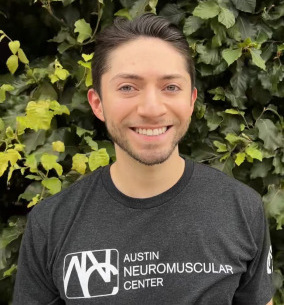Raising Mesothelioma Awareness, Impact on Patients and Family

Trey Quintanilla, MS, is a senior clinical research coordinator specializing in dermatology, neuromuscular and endocrinology clinical trials. With a passion for patient advocacy and bridging healthcare gaps, Trey has worked to connect underserved populations with clinical trial resources. Trey combines his work in clinical research and experience with mesothelioma patients to improve the relationships between patients, caregivers and researchers.
In the summer of 2023, I sat with a patient as he anxiously awaited a phone call with the biopsy results. He was a robust man in his early 60s, a father and a grandfather with a passion for woodworking and fishing.
His life took a drastic turn when he began experiencing persistent chest pain and shortness of breath. These symptoms, often dismissed as minor ailments, turned out to be the early signs of mesothelioma, a rare and aggressive form of cancer caused by exposure to asbestos.
As a clinical research coordinator in the clinical research industry, I focused on managing phase II-IV clinical trials, primarily related to neuromuscular disorders. However, my experience with patients with this particular form of cancer opened my eyes to the devastating impact of mesothelioma.
Raising Mesothelioma Awareness
Although my clinical trials did not directly address this deadly disease, I felt obligated to provide patients with resources and information about active clinical trials for mesothelioma. It was a way for me to contribute, in some small measure, to their fight against this relentless cancer.
Mesothelioma is a cancer that develops in the thin lining that covers most of the body’s internal organs. The disease is primarily linked to asbestos exposure, a toxic mineral that was widely used in construction, shipbuilding, and various industrial applications throughout the 20th century.
Despite its known dangers, asbestos use continued for decades, leading to the exposure of countless individuals. Today, more than 3,000 Americans are diagnosed with mesothelioma each year. Many of these face an often grim prognosis and shortened life expectancy.
The tragedy of mesothelioma lies not only in its severity but also in its latency. The disease can take decades to manifest, with symptoms appearing long after the initial asbestos exposure. This delayed onset means that many patients, like the ones I would see in the clinic, are caught off guard, with the disease having already advanced to a stage where treatment options are limited.
Holding on to Hope and Finding a Cure
In my role, I have had the privilege of working with numerous patients who were grappling with chronic and terminal illnesses. Each patient’s story is unique, but the common thread is the desire for hope — a hope for a cure, more time, and a better quality of life.
For mesothelioma patients, this hope often lies in the hands of clinical researchers who tirelessly work to develop new treatments and therapies. Although my primary focus has been on neuromuscular conditions, the lessons I have learned in clinical research are universally applicable.
I have seen firsthand how clinical trials can offer patients access to cutting-edge treatments that are not yet available to the general public. These trials are not just experiments; they represent a lifeline for patients who have exhausted all other options.
One of the most promising research areas for mesothelioma involves immunotherapy, a treatment that harnesses the body’s immune system to fight cancer. Unlike traditional chemotherapy, which attacks cancerous and healthy cells, immunotherapy targets only the cancer cells, potentially reducing side effects and improving outcomes.
Several clinical trials have shown encouraging results in recent years, offering new hope to patients with few options. While my work did not involve mesothelioma-specific trials, I felt a profound responsibility to provide my patients with information about ongoing research and clinical trials that could benefit them.
As of December 2024, more than 60 mesothelioma clinical trials are recruiting patients nationwide. These trials are leading the way in mesothelioma research and offering novel therapies and approaches to treatment. I made it a point to stay informed about these developments so that I could guide my patients toward potential opportunities for participation.
Empowering Patients and Loved Ones
The importance of raising awareness about mesothelioma cannot be overstated. Many patients and their families are unaware of the connection between asbestos exposure and the disease, which can delay diagnosis and treatment. Moreover, because mesothelioma is relatively rare, it often does not receive the same level of attention as more common cancers.
This lack of awareness can lead to isolation and despair among patients, who may feel they are fighting a battle that the world has forgotten. By providing patients with resources and information, I aimed to empower them in their journey. Knowledge is a powerful tool, and understanding the options available can help patients make informed decisions about their care. Additionally, connecting patients with clinical trials can offer them hope, knowing they are contributing to research that could one day lead to a cure.
My work in clinical research has taught me that the science of medicine is only part of the equation. The human side of clinical trials — the relationships between patients, caregivers, and researchers — is equally important. Patients are not just subjects in a study but individuals with families, dreams and fears. They are seeking not just treatment but also compassion and understanding.
While working with mesothelioma patients, I have been humbled by their resilience and determination. Despite the challenges they face, many continue to live their lives with courage and grace. Their stories serve as a reminder of the importance of empathy in clinical research. As researchers, we must never lose sight of the fact that our work has a profound impact on the lives of real people.